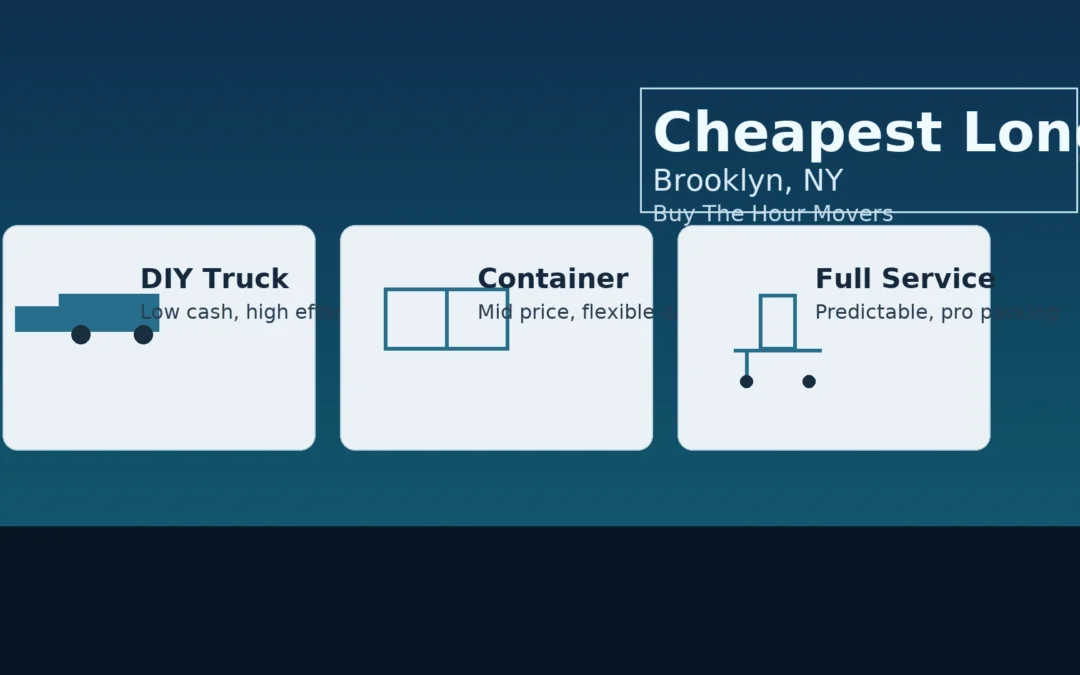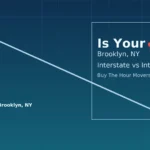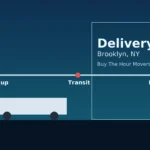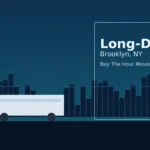If you want the lowest safe price for an interstate relocation out of Brooklyn, start with a quick survey from Buy The Hour Movers. Our Brooklyn long distance movers can price your shipment by weight, verify access at both ends, and build a plan that balances cost and risk.
Quick comparison, cost vs effort
There are three broad approaches. Each can be the cheapest for a specific situation. Your inventory, access, and timing decide the winner.
- DIY truck rental: lowest cash outlay if you have a very small shipment, strong helpers, easy parking, and time for driving. Risk is higher, time cost is high, fuel and tolls add up.
- Moving container or partial trailer: mid priced in many cases with flexible load windows, less driving stress, delivery timing can be wide.
- Full service long distance movers: most predictable for complex buildings and heavy inventories, can be cost competitive when you choose the right service level and avoid avoidable fees.
Use federal guidance while planning. Read FMCSA’s consumer pages on Protect Your Move and the rules for Estimating Charges. These explain written estimates, valuation, and what a mover must provide.
Is a moving truck rental cheaper than movers?
Often yes for very small moves, not always for typical one or two bedroom inventories. Add up all line items to make a fair comparison.
DIY cost components
- Truck base rate, per mile charge, fuel, tolls, insurance, and equipment rental
- Parking permits or day permits if required by buildings
- Lodging and meals if the drive exceeds one day
- Labor for loading and unloading if friends are not available
Hidden burdens
- New York City parking rules are strict. Review NYC DOT guidance on truck routing and commercial vehicle parking to avoid tickets and delays.
- Long carry from curb to elevator or stair flights increases time and risk.
- Driving a loaded box truck on unfamiliar highways increases exposure to weather and fatigue.
When DIY wins
- Studio sized shipment, light furniture, easy ground floor access on both ends
- You can load within strict building windows and have safe overnight parking
- You value cash savings over time and convenience
Are moving containers cheaper than hiring movers?
Sometimes. Containers reduce driving and can be attractive when your pickup or delivery dates are flexible. Watch the full price, not just the base fee.
Container pros
- You avoid long distance driving and one way truck fees
- Flexible loading window lowers rush costs
- Storage options can bridge a gap between closing dates
Container cons
- City loading may require curb space management and longer permits
- Delivery windows can be wide, which complicates move in planning
- You still need labor at both ends for heavy items
Ask your building about container rules. Some Brooklyn blocks and buildings prohibit pods at the curb. If curb space is tight, a full service plan with a legal truck route may be simpler. Always compare the written total including any local labor you will hire.
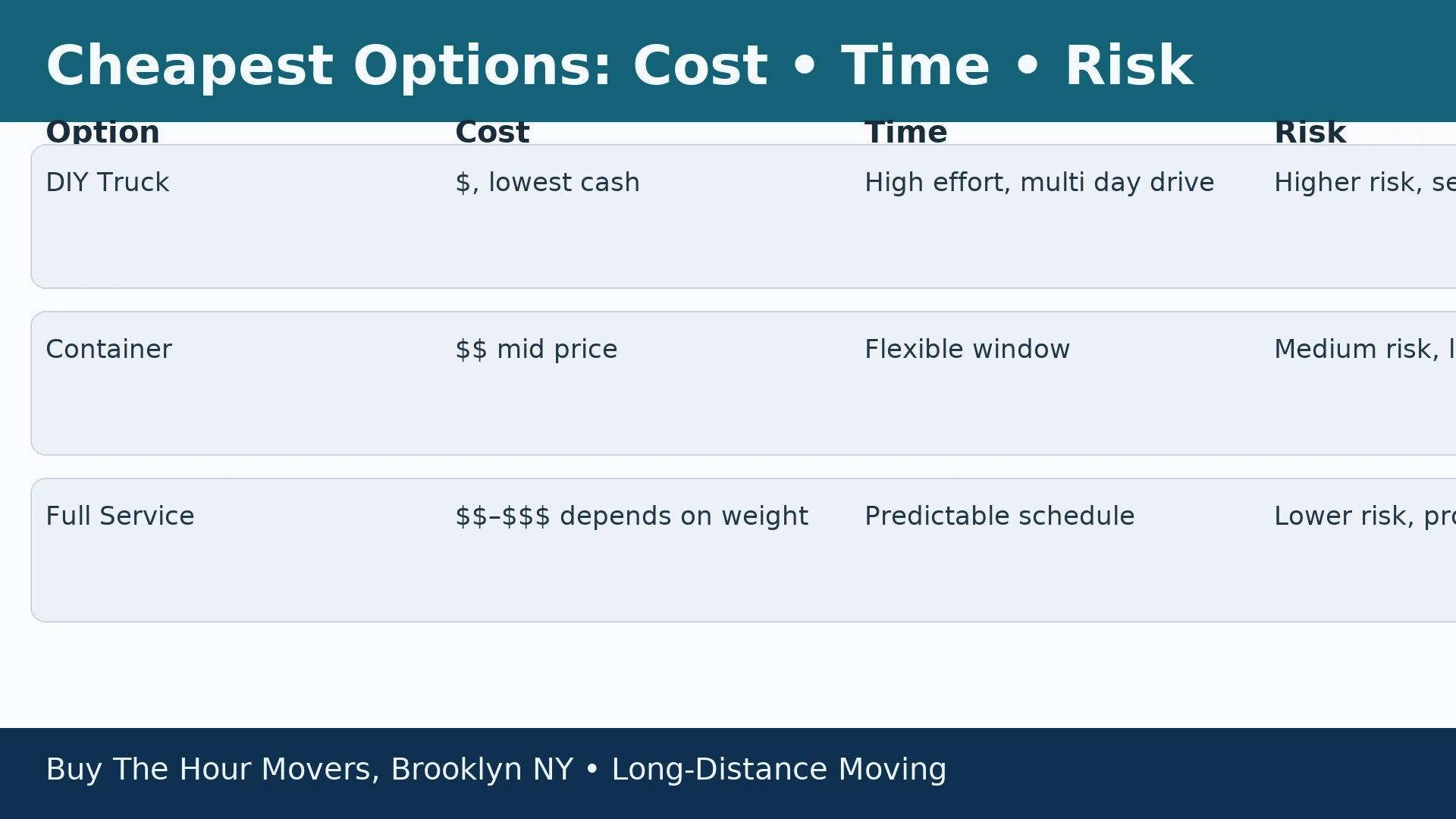
How do I move long distance on a tight budget?
You reduce weight, time, and risk, in that order. Each cut lowers the total without sacrificing safety.
1. Cut shipment weight
- Sell or donate heavy low value items before survey. Use the city’s official reuse network to keep items out of landfills, start with donateNYC’s directory: donateNYC.
- Replace cheap, heavy items at destination. Bookshelves, particle board desks, worn mattresses are often not worth interstate transport.
2. Pack smart, not everything
- Self pack non fragile items if you have time. Let pros pack TVs, glass, art, and dishes to reduce breakage and claim risk.
- Use consistent box sizes and label on two sides. Keep a parts box with screws and hardware.
3. Plan dates to avoid premiums
- Book earlier for peak months. Six to eight weeks is prudent for May through September. Mid month and mid week often have better availability.
- Lock elevator reservations and certificates of insurance early to keep crews efficient.
4. Use the right estimate type
- Ask for a binding or not to exceed estimate when your inventory is stable. FMCSA explains estimate types on Estimating Charges. A written estimate is required, a rate quote is not an estimate.
5. Do essential admin once, not twice
- File USPS mail forwarding early to prevent service hiccups at the new address: USPS Change of Address.
When should I book to get the best rates?
Supply and demand drive pricing and availability. A simple schedule strategy avoids stress fees.
- Peak season May through September, book 6 to 8 weeks out
- Shoulder months April and October, 4 to 6 weeks is often adequate
- Off peak November through March, 3 to 4 weeks can work for many routes
- Day of week Tuesday through Thursday often has better access to building elevators and loading docks
If your building needs a certificate of insurance, secure the template from management before you choose a date. Lack of COI approval can force a reschedule with added cost.
Which fees commonly increase long distance costs?
Understanding fee drivers keeps the total low and predictable.
- Long carry and stairs: added when the distance from truck to unit exceeds a threshold
- Shuttle truck: used when a tractor trailer cannot access your block
- Packing and crating: cartons, TV crates, glass or marble crates
- Parking and permits: city rules vary by block and building, know the curb plan
- Storage in transit: useful when closing dates do not align
- Valuation coverage: released value is minimal, full value protection increases cost and protection
For interstate moves, pricing rests on weight and miles, and paperwork is standardized. Read FMCSA’s booklet Your Rights and Responsibilities When You Move to understand valuation and delivery windows: FMCSA booklet PDF.
How to compare quotes the right way
Use the same inventory and the same access notes with every estimator. Ask for a written estimate that lists transportation and accessorial charges. Under federal rules a mover must provide a written estimate and you sign it when you agree, see FMCSA Estimating Charges. Keep your questions anchored to published rules on Protect Your Move.
Brooklyn access checklist
- Legal truck route to your block, use NYC DOT Truck Routing
- Elevator size, loading dock window, stair flights
- Certificate of insurance requirements from building management
- Curb space plan that follows NYC commercial vehicle parking
Example scenarios, where the cheapest option flips
- Studio to Philadelphia: DIY may win if both buildings have easy ground access and you can park legally at both ends. Fuel and tolls are a small fraction of the total.
- One bedroom to Raleigh: Container or consolidated full service can be close in price. Container wins if your dates are flexible and street space is available for loading. Full service wins if access is tight and you need a narrow delivery window.
- Two bedroom to Chicago with elevator reservations: Full service with a binding or not to exceed estimate often beats DIY once you count shuttle, parking, labor, and the risk of a long carry.
Local knowledge matters in Brooklyn
Interstate pricing has national rules, New York City access is local. Legal truck routes, loading windows, and curb management affect real costs. Study the NYC DOT pages for truck routing and parking for commercial vehicles to plan a clean load day.
Book a low stress plan today
Buy The Hour Movers is based in Brooklyn, NY. We build cost efficient long distance plans that follow FMCSA guidance and NYC rules. Start with a fast survey, then choose a service level that fits your budget.
- Request your quote: Brooklyn Long Distance Movers
- Talk to the team: Contact Us
We serve moves from Brooklyn and nearby neighborhoods and boroughs. Learn more about the areas we often serve:
Helpful links for planning
- FMCSA consumer guidance: Protect Your Move
- Estimate rules and paperwork: Estimating Charges, Subpart D
- Your rights booklet: Your Rights and Responsibilities When You Move
- USPS change of address: USPS Forwarding
- NYC reuse and donation network: donateNYC Directory
- NYC truck routing and parking: Truck Routing and Commercial Vehicle Parking

